Introduction: The Path of Integrity
In the journey of addiction recovery, maintaining personal integrity stands as a cornerstone for genuine transformation and long-lasting sobriety. Personal integrity involves consistently aligning one’s actions, thoughts, and words with deeply held moral values, which is crucial in overcoming addiction’s deceptive nature. This narrative explores the importance of integrity throughout the recovery process, providing insights and strategies to help individuals navigate this pivotal aspect of healing.
The Role of Integrity in Recovery
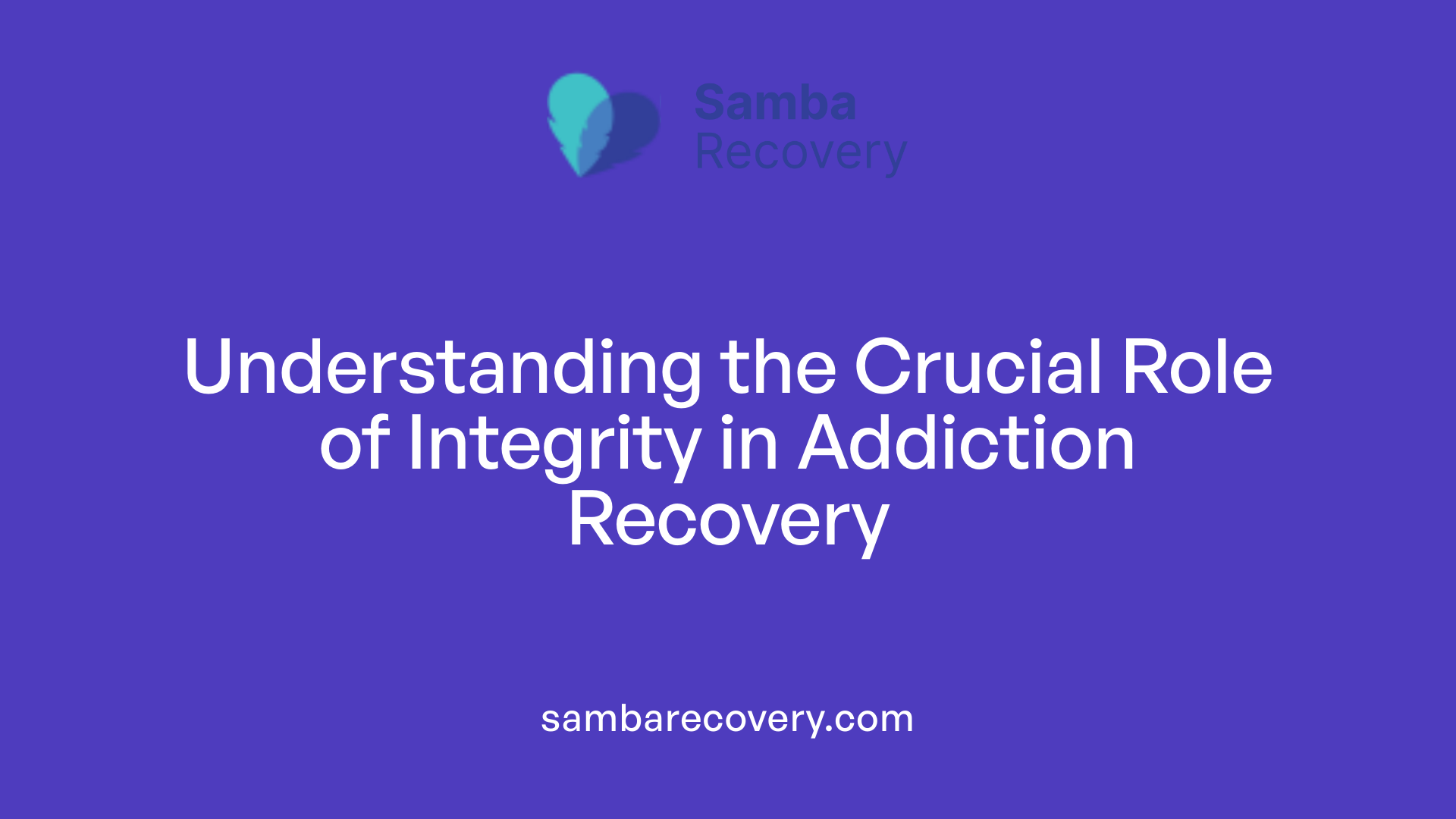
What role does integrity play in addiction recovery?
Integrity plays a critical role in addiction recovery as it fosters honesty and accountability, which are essential for rebuilding trust with oneself and others. The recovery journey often involves acknowledging past lies and deceptive behaviors, making integrity fundamental in overcoming self-destructive patterns.
Living with integrity encourages individuals to align their actions with their moral values, promoting a positive self-image vital for long-term sobriety. Embracing small acts of honesty not only reinforces positive behavior but also supports the development of lasting habits that contribute to recovery.
Building trust and accountability
Rebuilding trust with loved ones is a long process that requires a consistent demonstration of integrity following periods of addiction. As honesty minimizes the chances of relapse, individuals are better equipped to face their challenges openly, which strengthens their support network. Regular check-ins with recovery mentors or coaches can also reinforce accountability, ensuring individuals stay focused on their recovery goals.
Aligning actions with values
Integrity allows individuals to transform failures into stepping stones on their recovery journey. It requires taking ownership of their past actions and being honest about setbacks, which is essential for personal growth. Committing to a lifestyle aligned with integrity helps create positive relationships and a supportive environment, ultimately fostering sustained recovery.
Practicing Integrity Daily
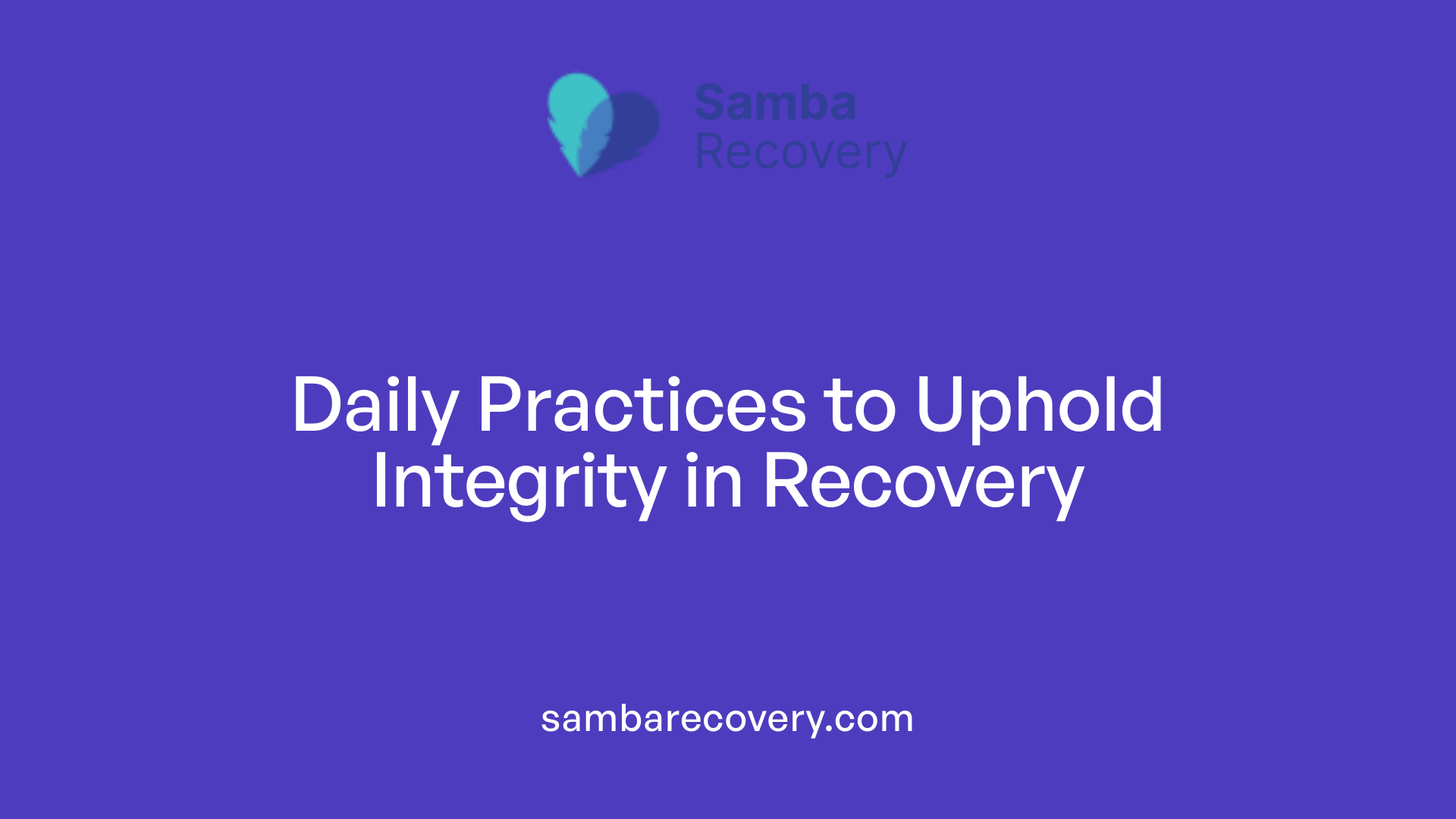
Daily Habits for Integrity
To maintain personal integrity during addiction recovery, establishing daily habits is vital. Begin by setting clear intentions each day to align your actions with your values. This could mean creating a morning routine that includes reflection or journaling about your goals and choices. Regular check-ins with a recovery coach or mentor can also help keep you accountable, providing support as you navigate your recovery journey.
Honesty and Accountability
Honesty and accountability are pivotal to rebuilding trust with yourself and others. Each interaction should involve a commitment to honesty, prioritizing open and truthful communication. Acknowledge your mistakes promptly, as this demonstrates maturity and aids in personal growth. Practicing rigorous honesty—being completely truthful—facilitates an environment where you’re more likely to seek help and avoid relapse triggers.
Overcoming Self-Deception
Overcoming self-deception involves confronting uncomfortable truths about yourself and your behaviors. Regular self-examination can help identify patterns of dishonesty or avoidance. Engage in personal inventories and keep a journal to track your thoughts and behaviors, reinforcing your commitment to integrity. Remember, integrity requires ongoing effort; it’s about continuously striving to be better and true to oneself.
Maintaining integrity is not merely a task but a way of life, enriching your recovery and positively impacting those around you.
Honesty as a Pillar of Recovery
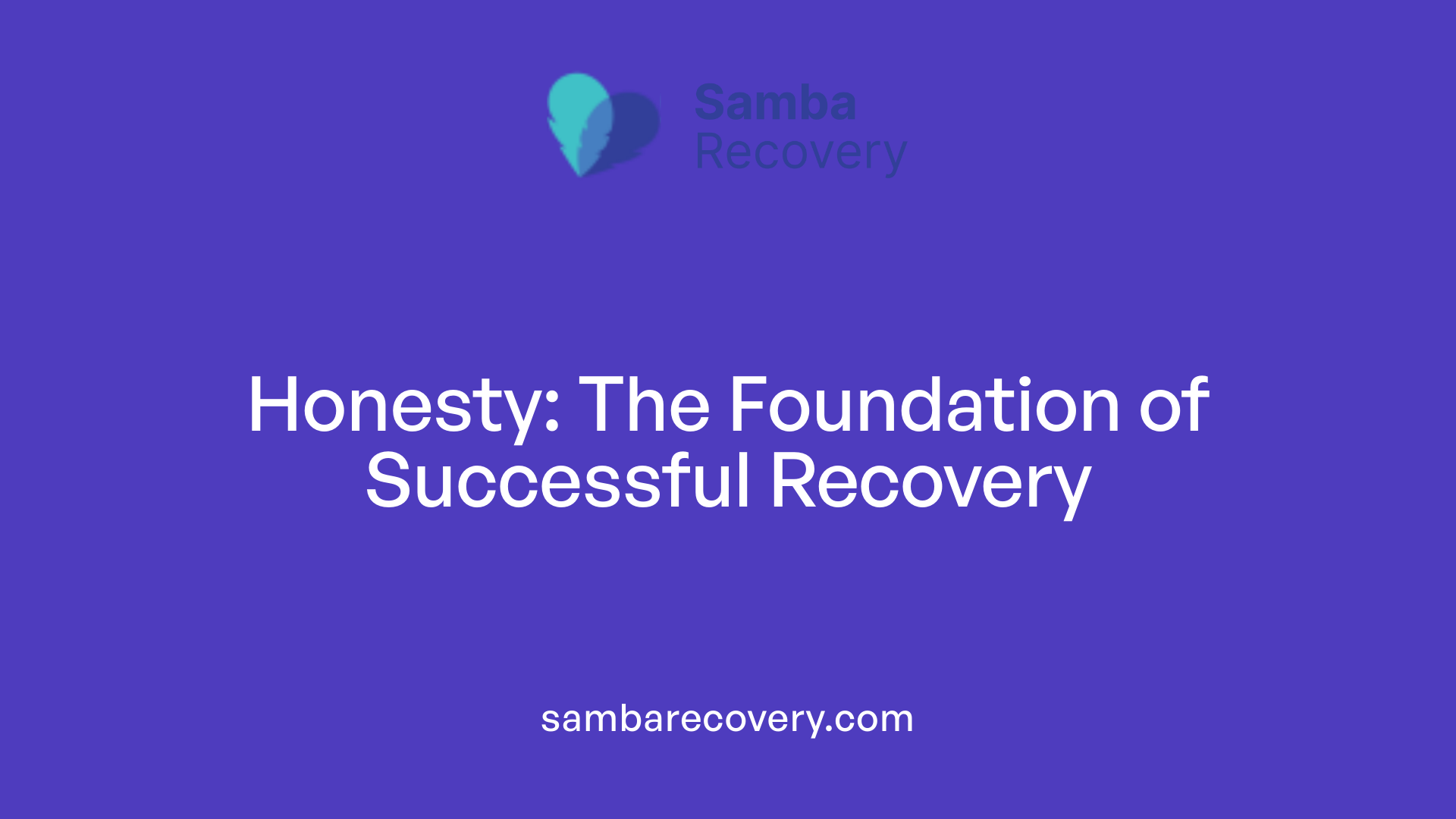
Importance of Honesty
Honesty is foundational to recovery, acting as both a guiding principle and a critical component for personal growth. It involves being genuine with oneself and others, fostering trust and accountability. By maintaining honesty, individuals can confront their addiction without the guilt or shame that often accompanies lies. This openness not only aids in self-awareness but also strengthens relationships that may have been damaged due to past behaviors linked to substance use.
Avoiding Relapse Triggers
Dishonesty can trigger relapse by encouraging old coping mechanisms. When individuals lie to themselves or others, they often evade confronting challenging emotions and situations, leading to isolation. Regular check-ins with recovery coaches or mentors are essential to maintain accountability. Furthermore, keeping a personal inventory and journaling can reinforce a culture of honesty in one’s daily life, preventing setbacks before they escalate into relapse.
Building Trust
Rebuilding trust with loved ones is critical and a gradual process. It requires consistent demonstration of integrity, highlighting the importance of small, honest actions in everyday choices. Engaging openly about struggles facilitates healing and helps create a supportive network. This not only empowers individuals but also strengthens their commitment to recovery and long-term sobriety. In essence, honesty serves as an invaluable tool for transforming relationships and establishing a strong foundation for a fulfilling recovery journey.
Accountability: A Framework for Success
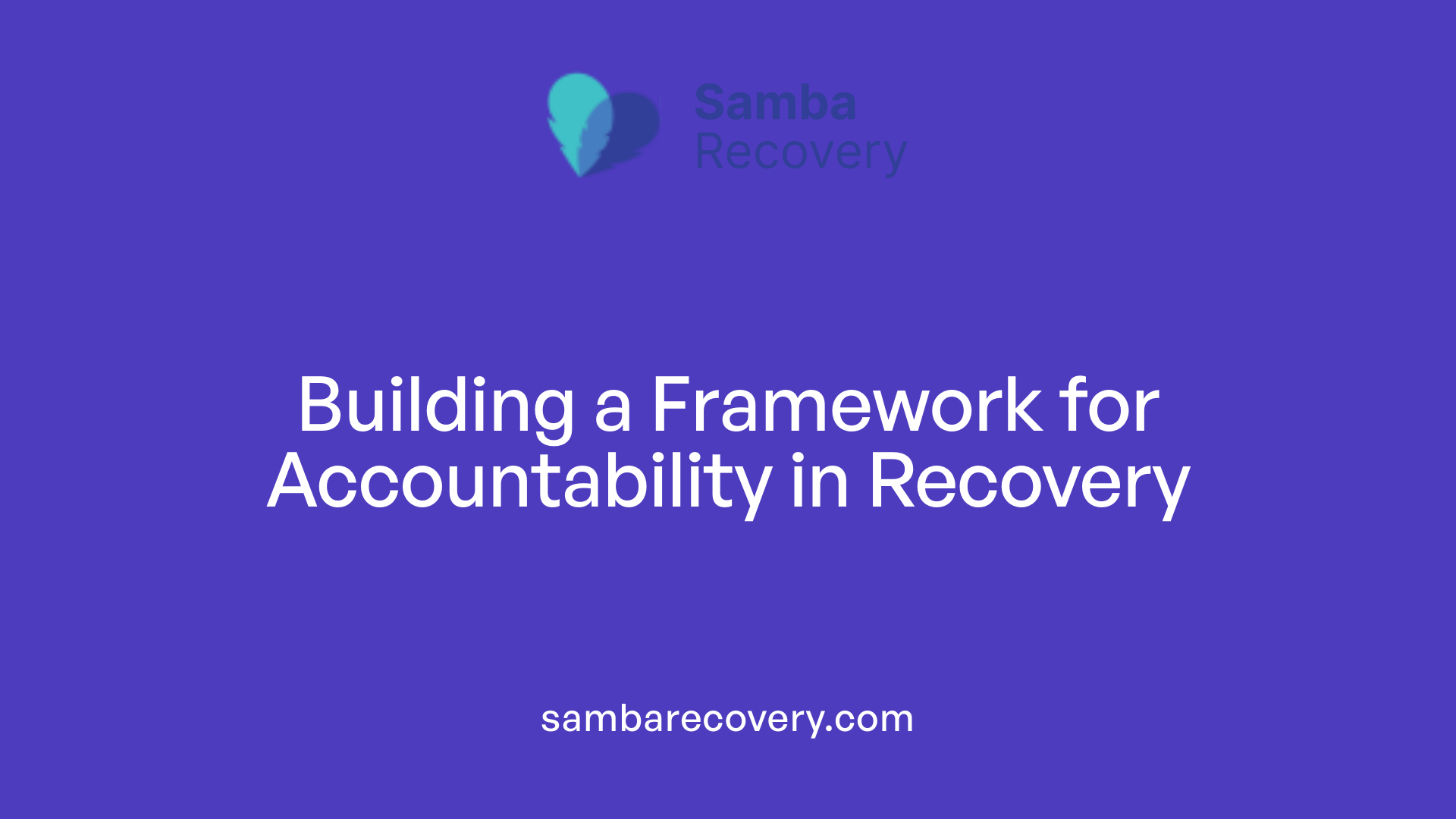
What are the personal responsibilities in recovery?
Personal responsibilities in recovery encompass a range of actions that empower individuals to take control of their lives. These responsibilities include:
- Being Accountable for Actions: This involves being honest with oneself and others about one’s choices and their consequences. Acknowledging mistakes openly fosters trust and creates a supportive environment.
- Upholding Commitments: Keeping appointments for therapy or support groups is crucial. It reflects dedication to the recovery process, helps in maintaining structure, and builds relationships within the recovery community.
- Creating a Supportive Environment: Engaging with peers who share similar values can motivate individuals to stay committed and feel less isolated. Surrounding oneself with supportive people enhances accountability and provides encouragement.
- Maintaining an Organized Living Space: A clean and organized environment not only contributes to a sense of order but also aids in coping strategies. It encourages mindfulness and reduces distractions that can lead to relapse.
In summary, integrating these responsibilities into daily life not only aids in recovery but also strengthens personal relationships, facilitating a smoother reintegration into everyday life.
Reducing relapse risk
Maintaining accountability significantly reduces the risk of relapse. A few strategies include:
| Strategy | Description | Purpose |
|---|---|---|
| Regular Check-Ins | Meeting with recovery coaches or mentors helps track progress. | Keeps individuals focused and motivated. |
| Personal Inventory | Conducting self-assessments aids in recognizing potential triggers. | Promotes self-awareness and proactive measures. |
| Open Communication | Being honest about feelings and struggles builds trust. | Strengthens support systems and reduces isolation. |
Enhancing recovery outcomes
Personal responsibility enhances recovery outcomes through various means. By committing to honesty and accountability, individuals:
- Experience increased self-esteem.
- Reinforce positive behaviors through consistent practice.
- Develop healthier relationships rooted in trust.
- Transform failures into opportunities for growth, fostering resilience.
Ultimately, embracing responsibilities not only fortifies recovery efforts but also enriches one’s journey towards a fulfilling life.
Embracing the AA Steps of Integrity
What does AA say about integrity?
Alcoholics Anonymous (AA) places great emphasis on integrity as a cornerstone of recovery, firmly linking it to principles of honesty and moral values. Two key steps in this process are Steps Eight and Nine, which highlight the importance of self-honesty and meaningful behavioral change in making amends.
In Step Eight, individuals are encouraged to compile a list of people they have harmed during their addiction. The willingness to make amends is pivotal, as it sets the stage for recovery. This step is not merely about acknowledging past actions; it’s about recognizing the impact of those actions and committing to the path of repair.
Step Nine moves beyond intention into action, requiring individuals to actively engage in making amends. This can often induce anxiety because it involves confronting those harmed, fearing their reactions. However, such vulnerability is crucial, as true recovery hinges on the willingness to face the truths of one’s past.
Ultimately, navigating these steps fosters a transformation in character. By aligning beliefs, intentions, and actions, individuals rebuild their integrity in a way that not only liberates them from the chains of addiction but also restores authentic connections with others. This process of moral growth is essential for sustaining long-term sobriety and cultivating a fulfilling life.
Overcoming Challenges to Integrity
Identifying Dishonest Behaviors
Recognizing patterns of dishonesty is the first step toward regaining personal integrity in recovery. Individuals may find it useful to conduct self-assessments or personal inventories to pin down moments where they have evaded the truth, whether through lying about their progress or avoiding discussions about their struggles. Keeping a journal can help track these behaviors and reinforce the commitment to honesty, making it easier to confront and change them.
Coping with Failure
Acknowledging that lapses in sobriety can occur is critical. It’s essential to understand that experiencing a setback does not define the entirety of one’s recovery journey. Embrace the notion that failure can be a learning opportunity. By accepting mistakes with self-compassion, individuals can foster resilience and commitment to continuous improvement.
Habitual Changes for Integrity
Integrating small daily practices that promote honesty can help establish a robust framework of integrity. Surrounding oneself with a supportive network that values truth can encourage individuals to adhere to their commitments. Regular check-ins with mentors or support groups also play a vital role in sustaining accountability and keeping focus on integrity, paving the way for a healthier, more honest recovery lifestyle.
The Fulfillment of Living With Integrity
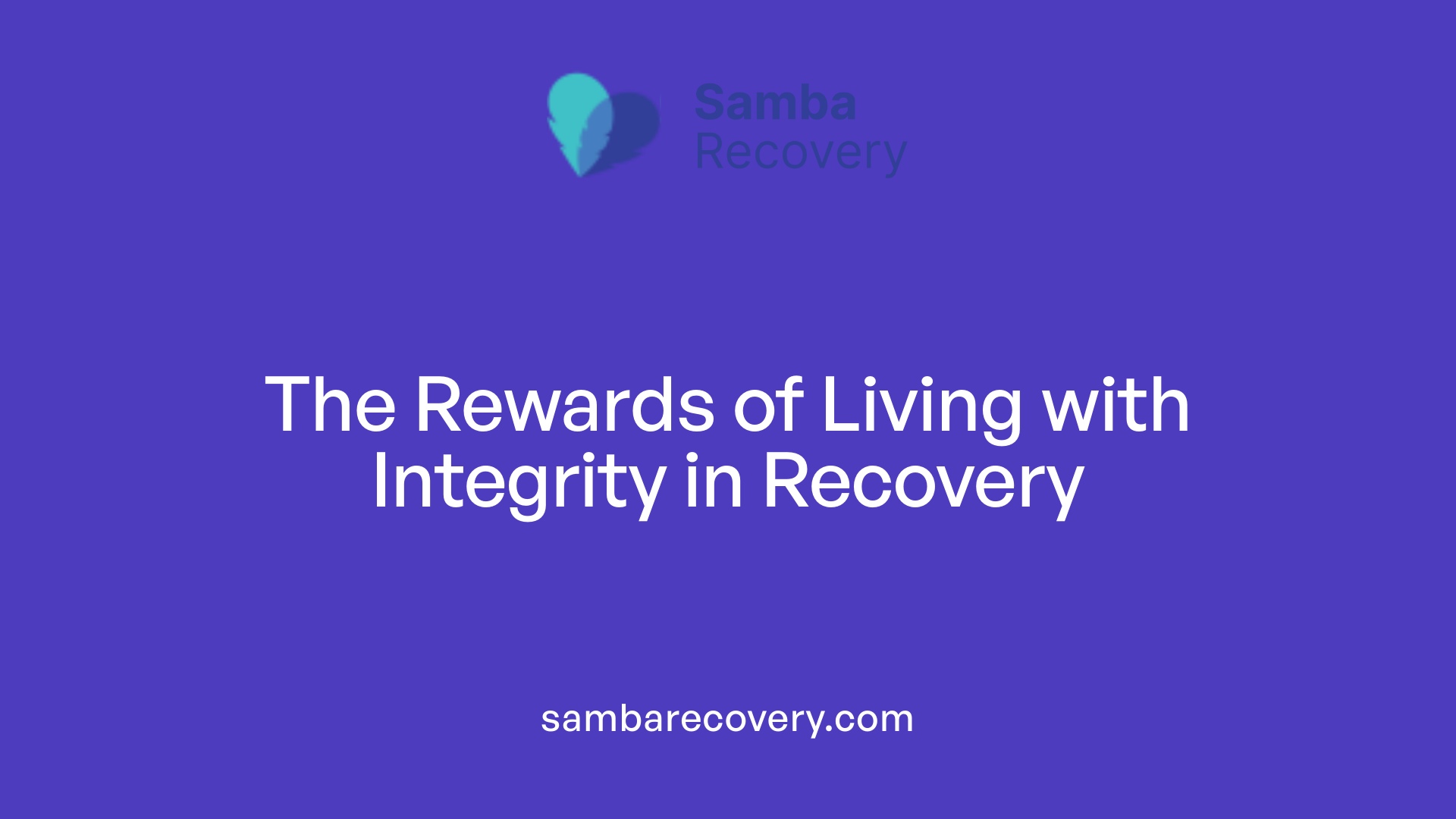
The rewards of integrity
Living with integrity during addiction recovery brings significant rewards, enhancing personal fulfillment and inner peace. By adhering to strong moral values, individuals nurture trust within themselves and their relationships. The consistent practice of honesty not only rebuilds relationships but also creates a support network that is essential for lasting sobriety.
Empowering oneself
Choosing integrity means taking responsibility for one’s actions and embracing vulnerability. This empowerment fosters self-awareness and growth, laying the groundwork for making healthier decisions. As individuals commit to living authentically, they often find that their self-esteem increases, allowing them to face daily challenges with renewed strength.
Developing emotional resilience
Honesty in recovery undermines the need for destructive coping mechanisms born from addiction. By addressing emotions openly and acknowledging struggles, individuals build emotional resilience. This practice prepares them to manage triggers effectively, reducing the likelihood of relapse and enhancing their capacity to strive for a fulfilling, sober life.
| Aspect | Description | Impact on Recovery |
|---|---|---|
| Trust Building | Fosters authentic relationships and community support | Critical for long-term sobriety |
| Personal Empowerment | Encourages accountability and self-reflection | Enhances decision-making skills |
| Emotional Resilience | Helps address feelings and cope with triggers | Minimizes relapse potential and promotes growth |
Conclusion: Integrity as a Lifelong Commitment
The journey of maintaining personal integrity in recovery is not just about achieving sobriety—it’s about transforming lives. Integrity fosters an environment of accountability, trust, and emotional resilience that supports individuals as they rebuild their lives and relationships. As we embrace honesty and responsibility, we create a foundation for a fulfilling, addiction-free life. The path to recovery, reinforced by integrity, becomes a journey of profound personal growth and self-discovery, making the commitment to integrity one of life’s most rewarding pursuits.
References
- The Role of Honesty and Accountability In Addiction Recovery
- Everyday Integrity: Why Small Moments Matter in Recovery
- Accountability in Recovery: What You Should Know – Golden Gate
- Honesty in Recovery
- Staying Accountable in Recovery
- On Keeping Integrity Intact in Recovery – Promises Behavioral Health
- For the Addict: Integrity is More Important than Sobriety






